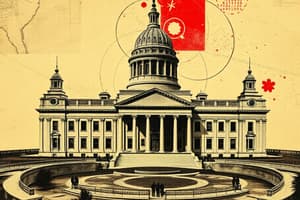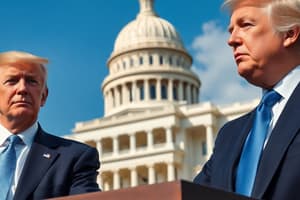Podcast
Questions and Answers
When did voters start electing their senators in the privacy of the voting booth?
When did voters start electing their senators in the privacy of the voting booth?
- Since the Constitution was ratified
- Since the mid-1850s
- Since the end of the Civil War
- Since 1913 (correct)
According to the Constitution, how were senators originally chosen?
According to the Constitution, how were senators originally chosen?
- By the state legislatures (correct)
- By the Senate itself
- By the President
- By popular vote
Why did the framers of the Constitution want senators to be elected by state legislatures?
Why did the framers of the Constitution want senators to be elected by state legislatures?
- To increase the chances of ratifying the Constitution (correct)
- To decrease the number of senators
- To give more power to the people
- To reduce the influence of the national government
What was a problem that arose in the mid-1850s regarding the election of senators?
What was a problem that arose in the mid-1850s regarding the election of senators?
What was a consequence of the struggle to elect senators in the mid-1850s?
What was a consequence of the struggle to elect senators in the mid-1850s?
What was an example of a state where the conflict over electing a senator resulted in a vacant Senate seat?
What was an example of a state where the conflict over electing a senator resulted in a vacant Senate seat?
What was required for the Seventeenth Amendment to be enacted?
What was required for the Seventeenth Amendment to be enacted?
Why did the Senate initially pass the resolution for the Seventeenth Amendment?
Why did the Senate initially pass the resolution for the Seventeenth Amendment?
What was the problem with Senate elections in the late 1800s and early 1900s?
What was the problem with Senate elections in the late 1800s and early 1900s?
What is the main difference between the original Constitution and the Seventeenth Amendment?
What is the main difference between the original Constitution and the Seventeenth Amendment?
What was the significance of Senator John Stockton's election?
What was the significance of Senator John Stockton's election?
Who contributed significantly to the passage of the Seventeenth Amendment?
Who contributed significantly to the passage of the Seventeenth Amendment?
What was the result of the law passed in 1866 regulating senatorial elections?
What was the result of the law passed in 1866 regulating senatorial elections?
What happens in the event of a vacancy in the Senate, according to the Seventeenth Amendment?
What happens in the event of a vacancy in the Senate, according to the Seventeenth Amendment?
How many bribery cases were brought before the Senate between 1866 and 1906?
How many bribery cases were brought before the Senate between 1866 and 1906?
When was the first time all senatorial elections were held by popular vote?
When was the first time all senatorial elections were held by popular vote?
What was the outcome of the disputes in the Delaware legislature in 1895?
What was the outcome of the disputes in the Delaware legislature in 1895?
What was the significance of Oregon's experiment with direct election in 1907?
What was the significance of Oregon's experiment with direct election in 1907?
Who was the reporter hired by William Randolph Hearst to write about corruption in the Senate?
Who was the reporter hired by William Randolph Hearst to write about corruption in the Senate?
What was the title of the series of articles written by David Graham Phillips?
What was the title of the series of articles written by David Graham Phillips?
How many states had elected U.S. senators through direct election or popular referendum by 1912?
How many states had elected U.S. senators through direct election or popular referendum by 1912?
What was the outcome of the efforts to reform Senate elections?
What was the outcome of the efforts to reform Senate elections?
Flashcards are hidden until you start studying
Study Notes
The Election of Senators
- Senators have been elected by the people in the privacy of the voting booth since 1913.
- The framers of the Constitution intended for senators to be chosen by state legislatures, as stated in Article I, Section 3.
The Original Process
- State legislatures elected senators, with the expectation that they would focus on their duties without pressure from the public.
- This process worked well until the mid-1850s, when growing hostilities resulted in vacant Senate seats.
Problems with the Original Process
- The struggle to elect senators reflected increasing tensions over slavery and states' rights, leading to the Civil War.
- After the Civil War, disputes among state legislators led to deadlocks, leaving some Senate seats vacant for extended periods.
- Corruption, intimidation, and bribery became common in the election of senators by state legislatures.
Calls for Reform
- The direct election of senators was first proposed in 1826, with momentum increasing in the 1890s.
- The Populist Party incorporated direct election into its party platform in the mid-1890s.
- Oregon pioneered direct election in 1907, followed by Nebraska, laying the foundation for other states to adopt similar measures.
The Turning Point
- William Randolph Hearst's publishing empire and David Graham Phillips' articles in Cosmopolitan galvanized public pressure for reform in 1906.
- By 1912, 29 states elected senators either as nominees of their party's primary or in a general election.
The Passage of the 17th Amendment
- Senator Joseph Bristow of Kansas offered a Senate resolution to amend the Constitution in 1911.
- The Senate approved the resolution, and it was sent to the House of Representatives for ratification.
- The House passed the amendment in 1912, and it was sent to the states for ratification.
- On April 8, 1913, Connecticut's approval gave the 17th Amendment the required three-fourths majority needed for enactment.
The Impact of the 17th Amendment
- The amendment restates the first paragraph of Article I, Section 3, providing for the election of senators by the people.
- It allows the governor or executive authority of each state to appoint a senator in the event of a vacancy until a general election occurs.
- The 17th Amendment marked the first time all senatorial elections were held by popular vote.
Studying That Suits You
Use AI to generate personalized quizzes and flashcards to suit your learning preferences.




